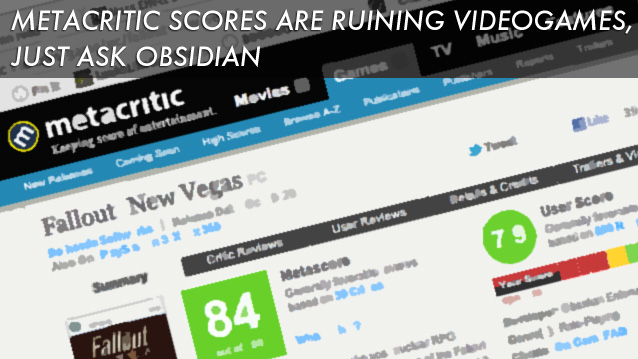


What? Obsidian had to lay people off because they weren't paid royalties for their work on Fallout: New Vegas? And they only get a bonus if a certain Metacritic score is hit? That's an evil thing for Bethesda to put in a contract. Wait a second, when did Bobby Kotick become their CEO?
That a company's livelihood is based upon a completely arbitrary score on Metacritic is a reprehensible problem with the game industry's business culture. In the case of Obsidian, their game Fallout: New Vegas scored an 84 on Metacritic, literally one point off from the agreed upon score (85) that would kick in a bonus, probably saving the jobs of the people there who were just laid off.
There's nothing inherently wrong with Metacritic. It's a tool—one used to aggregate scores around the web.That's total bullshit.
If Bethesda had a heart, I'm sure they could have floated Obsidian a loan to keep those people working. Hell, I'm willing to bet Obsidian would have (probably) repaid that loan over time. Did management at Bethesda spend all that Skyrim money on too may personal yachts?
Yes, Obsidian could have just made a better game, and circumvented all this (while probably being able to afford economy class yachts to tag along with Bethesda), but a 1-point difference on Metacritic can come down to basically nothing. What's the difference in quality between an 84 and an 85? Can someone give me an objective response?
I know a lot of you are in a rush to blame Metacritic for this too. But, just hold off on the witch hunt for 5 minutes. Read the rest of this first.
There's nothing inherently wrong with Metacritic. It's a tool—one used to aggregate scores around the web. It has no mind of its own, it has no responsibility to a contract between Bethesda and Obsidian. If Bethesda wants to use that tool in a terrible way, well, tough. That's the nature of a tool. A hammer can be used to build a house, or cave someone's skull in.
On the same token, reviewers themselves are not to blame. In the previous paragraph, you could replace “Metacritic” with “reviewers” and it still holds water. Some of you may argue that reviewers are responsible, and should hold some of the blame for this, but you're wrong. What you're suggesting, knowingly or not, is that reviewers should have padded their scores to help a company. Essentially you're arguing that a game shouldn't be judged on its own merits—and isn't that the whole point of this enterprise? Not only would a reviewer be doing himself a huge disservice by padding a score, they'd also do their audience a tremendous wrong by, in essence, lying to them.
No, those who reviewed New Vegas should not go back and revise their scores, either. That's a terrible precedent to set, and would open a floodgate of shit from PR companies and Publishers straight onto any website that you currently trust for unbiased reviews. Did someone give X game a below an 80% a month ago? Let's threaten them with blacklisting until they play ball.
Let's be honest with ourselves, the Metacritic clause in the contract between Obsidian and Bethesda is not the first time something like this has happened. I'm sure that publishers push shit clauses like this all the time, and I'm willing to bet this isn't the first time a company hasn't made salary as a result (and subsequently had to let someone go).
However, let me be clear, I can't substantiate any claims that this is a common practice in the games industry (I would love to talk directly to someone who is able to substantiate or refute this claim, however). The way certain industry insiders harp on and on about their game's Metacritic score leads me to believe that this sort of toxic contract stipulation is too common.
I say that a payout based on a Metacritic score is toxic because generally, when you agree to a contract, the terms are over things you can directly control. Much to the dismay of nearly every PR/Publishing entity out there, Metacritic has no strings to pull. You can't flip a switch that makes a reviewer positively review a certain game. So, why is it that this kind of thing made it into a large gaming developer's contract? If you asked me this question in the flesh, all I could do is look at you and make a noise that sounds approximately like a depressed dog chasing a cat.
I want to blame Obsidian for agreeing to a bad contract (and, really, the ultimate blame is theirs) but I can't help but feel that Bethesda has some play in this too. Yes, Obsidian agreed to a ridiculous term, but this is kind of like feeding a moldy sandwich to a hobo who hasn't eaten in a week. Sure, it's the starving vagrant's fault for eating the sandwich, but he's so desperate, he'd happily risk the food poisoning, because otherwise he'd surely be dead. I mean, before New Vegas, when was the last time anyone was even mildly jazzed about an Obsidian game? Alpha Proto- pfftthahahaha. Sorry.
If I gave a hobo a bad sandwich, wouldn't I be morally accountable for the food poisoning he ends up with?That missing out on the Metacritic bonus for Fallout: New Vegas lead to layoffs at Obsidian should be enough of an example that they were, financially, starving. I'd probably agree to a shitty contract too, if it was between that or having to layoff people I've seen day in, day out.
If I gave a hobo a bad sandwich, wouldn't I be morally accountable for the food poisoning he ends up with? I'm giving him an offer he can't refuse. Don't I have some kind of obligation to him at that point? Would it not make me an asshole for knowingly poisoning him?
Furthermore, Obsidian is staffed by a lot of the guys who were responsible for Bethesda's even having an interest in acquiring the Fallout brand. They made the Fallout name what it is - VaultBoy is their baby. So, not only am I giving the poor guy a bad sandwich, but if he accepts it, I'll let him see his estranged child again.
That's kinda fucked, guys.




 Wargame: AirLand Battle Preview
Wargame: AirLand Battle Preview Cleaning Out The Bureau Guide In GTA V
Cleaning Out The Bureau Guide In GTA V How to Cheat at Poker in Watch Dogs
How to Cheat at Poker in Watch Dogs SimCity Reviews Paint a Grim Picture of the Future’s Meaningless Game Reviews
SimCity Reviews Paint a Grim Picture of the Future’s Meaningless Game Reviews Just Cause 3: Here's how to liberate towns
Just Cause 3: Here's how to liberate towns